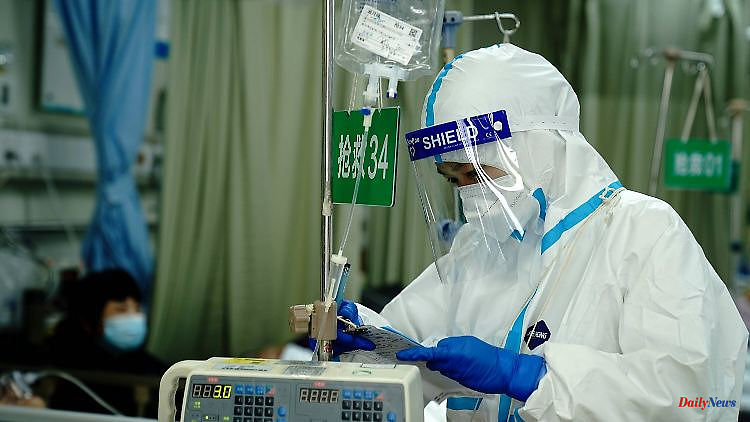There is a lack of hospital beds, medicines and vaccines: since China declared the end of the zero-Covid policy, numerous cities have descended into chaos. In Shanghai alone, more than five million people are already infected, experts warn. In addition, there are considerable doubts about the country's statistics.
The Corona wave has hit the Chinese economic metropolis of Shanghai with full force. Shanghai's Deji Hospital instructed its staff to prepare for a "tragic battle" with Covid-19. Half of the city's 25 million residents will become infected by the end of the year as the virus spreads largely unchecked. According to estimates, around 5.4 million residents are already infected, the hospital wrote on its official channel on the Chinese messenger service We Chat.
Two weeks ago, under pressure from anti-government protests and a flagging economy, China announced an abrupt departure from its strict zero-Covid policy. A corona wave is rolling through the country. However, since there is hardly any testing anymore, this is not reflected in the official figures. In addition, deaths are only officially attributed to Covid-19 if narrowly defined criteria are met. On Wednesday, Chinese authorities in the country of 1.4 billion people had not reported a single new Covid death for the second straight day, despite demand from funeral homes soaring over the past week.
Experts expect more than a million Covid deaths next year as the vaccination rate in the vulnerable older population is relatively low. According to government data, the vaccination rate in China is over 90 percent, but only 57.9 percent of adults have received a booster vaccination - for people over 80 the figure is only 42.3 percent. In addition, the vaccinated people were usually given the vaccine from the Chinese company Sinovac, which is considered less effective than that of the German company Biontech.
In addition, the about-face in Chinese politics has caught the weak health system unprepared: hospitals are desperately looking for beds and blood supplies, pharmacies for medicines. Even in the metropolises of Beijing and Shanghai, where the healthcare system is significantly better than in the rest of the country, the situation is worrying. At a hospital in Beijing, state-run CCTV footage showed rows of elderly patients in intensive care units breathing through oxygen masks. It was unclear how many of these had Covid.
Deputy chief of the hospital's emergency department, Han Xue, told CCTV it was taking in 400 patients a day, four times the usual rate. "These patients are all elderly people with underlying medical conditions, fever and respiratory infections who are in very serious condition," Han said. The Shanghai Deji Hospital chose drastic words. "Christmas Eve, New Year's Day and Chinese New Year will be uncertain this year," it said. "In this tragic battle, the entire Shanghai area will fall, and we will infect all the hospital staff! We will infect the whole family! Our patients will all be infected! We have no choice, we cannot escape."
China uses restrictive criteria when counting corona deaths. Since the outbreak of the pandemic in early 2020, the country has reported just 5,241 deaths - a tiny number in a global comparison. The USA alone has registered more than a million corona deaths, in Germany there are more than 160,000. A leading Chinese medical expert said on Tuesday that only deaths caused by pneumonia and respiratory failure after Covid infection are classified as caused by the coronavirus.
Deaths from complications, including underlying diseases made worse by the virus, would not be included in the official count, said Wang Guiqiang, head of the infectious diseases department at Beijing University First Hospital. The criteria have been changed because the omicron variant is less likely to have other life-threatening symptoms.
Epidemic experts outside of China assume that numerous corona cases will not be recorded as a result. The new definition "clearly will not capture all deaths from Covid," said Aaron Glatt, an infectious disease expert at Mount Sinai South Nassau Hospital in New York and spokesman for the Infectious Diseases Society of America. "To say that you will ignore everything else that is going on in the body makes no sense and is scientifically inaccurate."
Even if China broadened the definition of Covid deaths, the official data is unlikely to reflect the situation on the ground given the rapid spread of infections, said Chen Jiming, a researcher at China's Foshan University. "The reported number of cases and deaths is only a very small part of the actual values," he said. Ben Cowling, an epidemiologist at the University of Hong Kong's School of Public Health, said the official number of deaths is very low, even if a broader definition were used, "because so little testing is being done" after China stopped mass surveillance.












